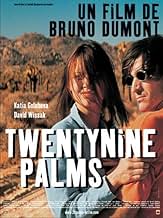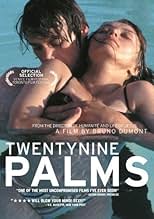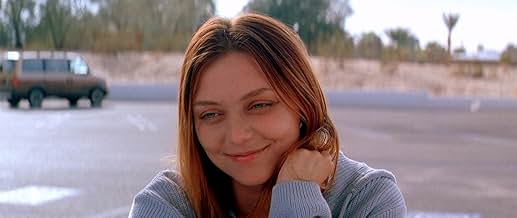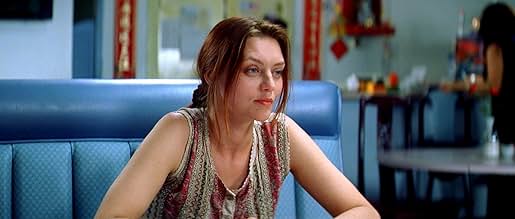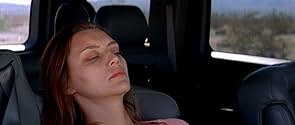IMDb RATING
5.1/10
5.3K
YOUR RATING
David, an American photographer, and his Russian girlfriend Katia are scouting locations for a photo shoot. During the day, they drive through some of the wildest, most bizarre desert landsc... Read allDavid, an American photographer, and his Russian girlfriend Katia are scouting locations for a photo shoot. During the day, they drive through some of the wildest, most bizarre desert landscapes, but their luck begins to run out.David, an American photographer, and his Russian girlfriend Katia are scouting locations for a photo shoot. During the day, they drive through some of the wildest, most bizarre desert landscapes, but their luck begins to run out.
- Director
- Writer
- Stars
- Awards
- 1 win & 2 nominations total
Yekaterina Golubeva
- Katia
- (as Katia Golubeva)
- Director
- Writer
- All cast & crew
- Production, box office & more at IMDbPro
Featured reviews
A three-legged dog, a dead body lying naked in the middle of the desert, a cop on his walkie-talkie calling for backup and a road block miles from the nearest inhabitant. These and other bizarre things show up in Twentynine Palms, the latest film by Bruno Dumont (La Vie de Jesus, L'Humanite). It is essentially a horror film that might easily be called "Scream 4". The opening scenes are beautiful and serene. David (David Wassik), an independent photographer from Los Angeles, and Katia (Katia Golubeva), a young woman without work, travel in a red 4X4 Hummer toward the vast California desert preparing to do a photo shoot for a magazine near the Joshua Tree National Park. The road leads to a motel in the city of 29 Palms, a desert oasis that in the film consists of one gas station, one hotel, and a swimming pool. Dumont says that he filmed in the U.S. rather than his native France because he "
felt the need to change space, ingredients, colors... and it is while filming in California that I had a true shock". The shock extends to the viewer as well.
There is little dialogue or action in the conventional sense. The communication between the couple is complicated by the absence of a common language: he speaks English, she only speaks French. What conversation exists is trapped in a level of superficial banality. The lovers explore the desert in their 4X4 and are focused entirely upon their own pleasure, seemingly defined by their sexuality. They swim in the motel pool, watch game shows on television, eat, make love in the middle of the desert, eat some more, argue and make up, then make love some more, all shown in explicit detail. Everything is familiar, a slice of typical Americana, yet nothing is as it seems.
Little by little the milieu becomes oppressive; a quiet and incoherent fear begins to settle in, an abstract fear because as Dumont says, "there is no reason to be afraid." At the end, nothing can fill the emptiness but destruction. The contrast between the poetry of nature and the constricted range of the human experience is clear. In this world without a spiritual core, the screams of pain and screams of delight are indistinguishable and anguish has the same meaning as pleasure. According to Dumont, "There is at the same time the bliss of pure happiness and absolute horror, the capacity to generate the two extremes: the hyper violence and the hyper pleasure. This is a couple that lives for pure pleasure and that will be led into abomination."
One cannot be neutral about a Bruno Dumont film (many people walked out during the Vancouver showing). His audiences are polarized between those who love and those that detest his films and the director seems disinterested in reconciling the two. I found this film extremely difficult to watch and even harder to be emotionally engaged with the characters. Dumont tests our endurance with scenes of brutal violence, making no concession to our sensibilities. In bringing us face to face with our worst nightmare, however, he forces us out of our state of emotional detachment and compels us to react, not with our minds or even our hearts, but viscerally with the totality of our being. Far removed from the pre-digested package cinema of Hollywood, Dumont has made an important statement about American values. The question must be asked however -- with films like Twentynine Palms that are so off-putting, will there be anyone who notices?
There is little dialogue or action in the conventional sense. The communication between the couple is complicated by the absence of a common language: he speaks English, she only speaks French. What conversation exists is trapped in a level of superficial banality. The lovers explore the desert in their 4X4 and are focused entirely upon their own pleasure, seemingly defined by their sexuality. They swim in the motel pool, watch game shows on television, eat, make love in the middle of the desert, eat some more, argue and make up, then make love some more, all shown in explicit detail. Everything is familiar, a slice of typical Americana, yet nothing is as it seems.
Little by little the milieu becomes oppressive; a quiet and incoherent fear begins to settle in, an abstract fear because as Dumont says, "there is no reason to be afraid." At the end, nothing can fill the emptiness but destruction. The contrast between the poetry of nature and the constricted range of the human experience is clear. In this world without a spiritual core, the screams of pain and screams of delight are indistinguishable and anguish has the same meaning as pleasure. According to Dumont, "There is at the same time the bliss of pure happiness and absolute horror, the capacity to generate the two extremes: the hyper violence and the hyper pleasure. This is a couple that lives for pure pleasure and that will be led into abomination."
One cannot be neutral about a Bruno Dumont film (many people walked out during the Vancouver showing). His audiences are polarized between those who love and those that detest his films and the director seems disinterested in reconciling the two. I found this film extremely difficult to watch and even harder to be emotionally engaged with the characters. Dumont tests our endurance with scenes of brutal violence, making no concession to our sensibilities. In bringing us face to face with our worst nightmare, however, he forces us out of our state of emotional detachment and compels us to react, not with our minds or even our hearts, but viscerally with the totality of our being. Far removed from the pre-digested package cinema of Hollywood, Dumont has made an important statement about American values. The question must be asked however -- with films like Twentynine Palms that are so off-putting, will there be anyone who notices?
i can easily understand why this film has been so hated, but i must say that it is at times one of the most beautiful, and at others, one of the most disturbing films i've ever seen. after seeing humanite, i walked in to the theatre with very low expectations (i'm not a dumont fan in the least), but something in the stark beauty of the photography sucked me in, i found the numb vacant space of the characters, and hook, line and sinker, fell right into dumont's trap. i doubt i would recommend this film to anyone but my closest (and most tolerant) friends, but have to say that i loved it, and thing it may also be found rewarding by other patient and adventurous viewers.
Just don't focus on this stuff people say that nothing happens for hours and that at the end there 'finally' is some violence. It's not true. A lot of things happen. And if nothing happens then you're just watching a wonderful shot.
Just don't focus all the time about what's coming next and what this and that could mean while watching a movie. Just relax and watch the movie. Lean back. It's about a couple. They're driving around in the desert (he's doing some location scouting for a photography job). They love, they hate, they fear each other. Sometimes they don't understand each other but everything seems to go along. They're driving along in this vast free desert. Alone it seems.
And did I mention you should relax when watching a movie? You can't talk to a screen, so why blame the movie?
Just don't focus all the time about what's coming next and what this and that could mean while watching a movie. Just relax and watch the movie. Lean back. It's about a couple. They're driving around in the desert (he's doing some location scouting for a photography job). They love, they hate, they fear each other. Sometimes they don't understand each other but everything seems to go along. They're driving along in this vast free desert. Alone it seems.
And did I mention you should relax when watching a movie? You can't talk to a screen, so why blame the movie?
Well this one definitely isn't for everyone, as you can tell by the comments. For awhile, I liked this movie. I kind of liked these two driving around in the desert. The movie had that sort of dreamlike Zabriskie Point thing going on. In fact, along those lines, I'd mention that the film did feel like something from the 1960s (in a good way).
Katia Golubeva is a pretty enough girl, and we see a lot of her.
I know from regular trips to Death Valley that Europeans have a special respect for American deserts. At Badwater Junction in Death Valley, you can walk out onto the salty flats and despite the fact that you're in a giant valley, they know enough to whisper, or remain silent altogether. It's a pensive respect for the desert I wish more Americans had.
Here, you get a lot of California desert; always a good thing (to me). I liked these two characters when they were getting along - there was a weird and charming sort of innocence in their sex life and affection for each other.
Didn't fully get why they were constantly sniping at one another or why they kept having falling outs with each other. And that seems to be important to the overall point of the film, and I'm still thinking about it. I wanted to slap them - especially David - when he was being a jerk.
Because you should *never* take a sexually liberated French girl naked in the desert for granted that way (Am I right?).
The end is jarring, and a metaphor for something but I'm not sure what, exactly. Something, I suspect, about the fact that the two characters should have been a little more tender and appreciated each other more (especially on the dude's part), what with all the meanness and cruelty in the world (and so on).
This is not for everyone. It is slow moving, beautiful to look at, with characters who occasionally charm and occasionally irritate. The end sequence is disturbing and unpleasant.
If you're a fan of mainstream Hollywood, you might find this excruciatingly boring. The pervasive quiet of the movie makes the end all the more startling.
This film was not an unqualified success, but there's a fair amount to like here, I think. For certain people, anyway.
Katia Golubeva is a pretty enough girl, and we see a lot of her.
I know from regular trips to Death Valley that Europeans have a special respect for American deserts. At Badwater Junction in Death Valley, you can walk out onto the salty flats and despite the fact that you're in a giant valley, they know enough to whisper, or remain silent altogether. It's a pensive respect for the desert I wish more Americans had.
Here, you get a lot of California desert; always a good thing (to me). I liked these two characters when they were getting along - there was a weird and charming sort of innocence in their sex life and affection for each other.
Didn't fully get why they were constantly sniping at one another or why they kept having falling outs with each other. And that seems to be important to the overall point of the film, and I'm still thinking about it. I wanted to slap them - especially David - when he was being a jerk.
Because you should *never* take a sexually liberated French girl naked in the desert for granted that way (Am I right?).
The end is jarring, and a metaphor for something but I'm not sure what, exactly. Something, I suspect, about the fact that the two characters should have been a little more tender and appreciated each other more (especially on the dude's part), what with all the meanness and cruelty in the world (and so on).
This is not for everyone. It is slow moving, beautiful to look at, with characters who occasionally charm and occasionally irritate. The end sequence is disturbing and unpleasant.
If you're a fan of mainstream Hollywood, you might find this excruciatingly boring. The pervasive quiet of the movie makes the end all the more startling.
This film was not an unqualified success, but there's a fair amount to like here, I think. For certain people, anyway.
10ik-12
This seems to be a serious film, although it's easy to misunderstand it or to be appalled by it. Scenes of "animalistic" sex with almost no conversation or foreplay, scenes of horrific violence, hardly any plot -- all that might be a total turn-off for many.
I was lucky to attend a Q&A session with the director, where he answered a lot of questions. The idea for this film was born when Dumont was in California desert, and, as he puts it, "I was afraid". It seems the time and space and the silence and the power of it all influenced him very much. Among other things, he addressed the audience before the film started, with "if you become afraid when you watch this film, just cover your face with hands".
He also stated later that the film is an experiemnt at expressing his feelings, and has no intent, or narrative, or message. The director is free to express himself, and the spectator is free to see whatever (s)he may in the film and take that away. The characters are stripped of anything that would make them likeable or dislikeable, and generally of anything but the very primitive in order to make the experience pure.
The characters are not the focus of the film; sound and background are. "Untreated" location sound was used throughout the film and is very important for the director to convey the sense of the place and time. In one scene one could even hear the sound of lighting generator behind the camera, which Dumont refused to edit out during the argument with the sound crew. Camerawork is also original and important in this experience.
The serenity of transcendent scenes remind me of Zabriskie Point. Using explicit sex and violence remind me of Irreversible and I Stand Alone. Yet, this is certainly not a "following", this is a highly personal expression, which is designed to generate a highly personal experience for any viewer.
Altogether NOT recommended if one is looking for "normal" filmgoing experience.
I was lucky to attend a Q&A session with the director, where he answered a lot of questions. The idea for this film was born when Dumont was in California desert, and, as he puts it, "I was afraid". It seems the time and space and the silence and the power of it all influenced him very much. Among other things, he addressed the audience before the film started, with "if you become afraid when you watch this film, just cover your face with hands".
He also stated later that the film is an experiemnt at expressing his feelings, and has no intent, or narrative, or message. The director is free to express himself, and the spectator is free to see whatever (s)he may in the film and take that away. The characters are stripped of anything that would make them likeable or dislikeable, and generally of anything but the very primitive in order to make the experience pure.
The characters are not the focus of the film; sound and background are. "Untreated" location sound was used throughout the film and is very important for the director to convey the sense of the place and time. In one scene one could even hear the sound of lighting generator behind the camera, which Dumont refused to edit out during the argument with the sound crew. Camerawork is also original and important in this experience.
The serenity of transcendent scenes remind me of Zabriskie Point. Using explicit sex and violence remind me of Irreversible and I Stand Alone. Yet, this is certainly not a "following", this is a highly personal expression, which is designed to generate a highly personal experience for any viewer.
Altogether NOT recommended if one is looking for "normal" filmgoing experience.
Did you know
- TriviaCasting Director Elisabeth Jereski originally planned to cast Marine Corporal Joshua James in the lead, but was rebuffed by his local Squadron Commander, Lt. Col. F.J. Usry, as the graphic sex scenes and violence would portray the Marine Corps, with which James was actively serving in 29 Palms, in a "less than positive light in the community."
- SoundtracksAkata Sun Dunchi
Performed by Takashi Hirayasu and Bob Brozman
Written by Takashi Hirayasu
Instrumental arrangements by Takashi Hirayasu and Bob Brozman
Published worldwide by Riverboat (UK) Music
Under license from World Music Network
- How long is Twentynine Palms?Powered by Alexa
Details
- Release date
- Countries of origin
- Official sites
- Languages
- Also known as
- 29 palmas - Pasiones salvajes
- Filming locations
- Production companies
- See more company credits at IMDbPro
Box office
- Gross US & Canada
- $54,523
- Opening weekend US & Canada
- $12,870
- Apr 11, 2004
- Gross worldwide
- $167,999
Contribute to this page
Suggest an edit or add missing content




